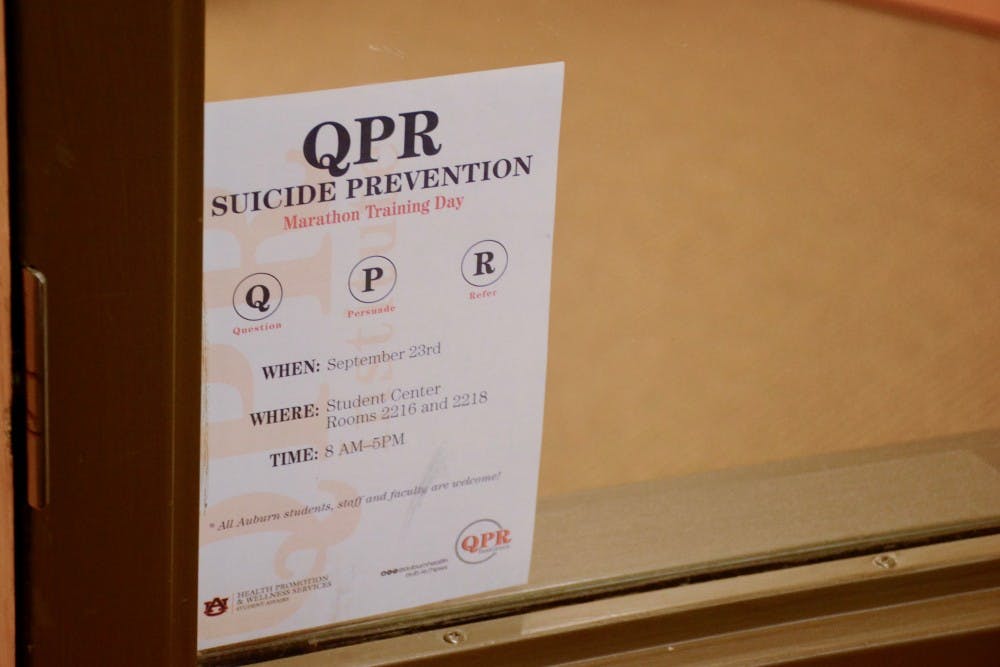Question. Persuade. Refer. These are the three steps Health Promotion & Wellness encourages students to act upon when they believe someone might die by suicide.
It’s an increasing cause of death in the Auburn-Opelika area, according to the Lee County Coroner’s Office, but the division of Student Affairs hopes that marathon training sessions performed Monday will see more people on Auburn’s campus prepared for deterring such situations.
“QPR is like CPR for suicide,” said Markie Pasternak, Health Promotion & Wellness Service’s coordinator of outreach and peer education. “It started [at Auburn] back in 2015, and now we’ve trained almost 8,000 people since then.”
QPR training teaches how a variety of circumstances can be attributed to suicide based on several risk factors. The circumstances may be biological, such as race or age; psychological, such as the loss of a parent; inhibiting substances or environmental, such as in instances caused by the time of year or the area where they live.
The program states that in a suicide scenario, one should first question the affected person by directly asking if they have suicidal thoughts or actions. Students who went through the training were advised to speak up if they have a friend or family member who seems to be acting differently than normal.
Pasternak said that 67% of college students share their thoughts with a friend, not a counselor or parent.
The more direct one questions a person, the more direct of an answer they will receive, according to Pasternak. Potential signs of depression — such as sleeping more often, absence from social situations or lack of energy — are sometimes linked with suicide and are things to look out for in this stage of the process, according to the QPR program.
Pasternak said that in addition to addressing the question head-on, the tone in which the question is asked is also crucial.
“If I’m kinda scared to ask the question and I say, ‘You’re not suicidal, are you?,’ that comes off in a judgmental tone,” she said. “It’s a leading question.”
The arguments one gives for living, termed as the “wall of resistance,” is another key aspect to helping people, according to the QPR program. Examples QPR gives include explaining what others would think and how they would react.
In the case of one NC State student featured in a video shown at the marathon sessions, his dog’s need for care kept him from dying.
The second step, “persuasion,” applies to mostly hearing out the person with nonverbal cues. Actions such as giving eye contact, nodding as the person answers and repeating an affirmation with different wording are all beneficial to ensuring they know they are being listened to.
“This person feels very isolated right now because of a bunch of situations that are personal to them,” Pasternak said. “This person needs your full attention.”
After offering assistance to an individual and getting them in touch with wellness resources, one moves into “referring.” This stage can involve physically walking with the person to a counseling office and ensuring they arrive safely.
One suggested resource for students by Health Promotion & Wellness Services is the Student Counseling Services located in the basement of Haley Center. Student Counseling Services offers an on-call counselor for walk-in appointments.
“It’s about referring them to the right resource,” Pasternak said. “If it’s two in the morning and you walk into your apartment and your roommate is about to die by suicide, that’s a 911 call.”
The Monday trainings were free, one-hour, back-to-back sessions in support of National Suicide Prevention Month.
From 8 a.m. to 5 p.m., participants of each training were coached in the three steps and informed of mental health groups and relevant events around campus.
Abbey Brunault, senior in psychology and volunteer for Health Promotion & Wellness Services during the marathon sessions, expressed confidence that another wave of students would be better equipped for suicide prevention.
“We’ve had some people coming for class credits, some people just out of interest, which is good,” Brunault said. “Any reason people are coming to learn this information is really cool because there’s not a lot of other outlets where people can learn this practical knowledge of suicide prevention.”
Another day of marathon training will be held in the spring semester.
Do you like this story? The Plainsman doesn't accept money from tuition or student fees, and we don't charge a subscription fee. But you can donate to support The Plainsman.





